Hurricane Milton is Coming: Are You in the Evacuation Zone? Prepare NOW with These Life-Saving Tips
Hurricane Milton is expected to strengthen and become a dangerous storm as it approaches the west coast of Florida on October 9, 2024.
As Hurricane Milton approaches, authorities have set up evacuation zones and given important safety advice for people in the storm’s path.

People in Orange County, Florida, are collecting sandbags for free to protect themselves from the storm on October 8, 2024.
Staying informed is key to protecting yourself from strong winds and dangerous storm surges, which could create life-threatening waves.
Even areas away from the coast are at risk from hurricane-force winds, and heavy rainfall could cause dangerous floods, including flash floods and river flooding in parts of Florida.
A damaged car stuck in sand from Hurricane Helene is seen in Treasure Island, Florida, ahead of Milton’s expected arrival on October 7, 2024.
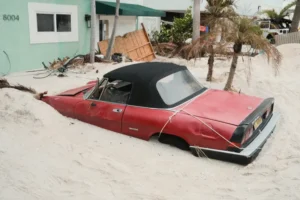
With these risks in mind, it’s important for residents to review the evacuation zones and follow the steps below to protect their lives and property.
Prepare Understand your hurricane risks. This includes possible heavy rain, strong winds, flooding, and tornadoes, which can affect areas far from the storm’s center.
Know your area’s hurricane plans, including plans for work, children’s daycare, and places you frequently visit, like grocery stores.
Stock up on important supplies. Make sure you have medications, pet supplies, and disinfectants ready in a go-bag or your car. You may not have access to these supplies for days or even weeks after the storm.
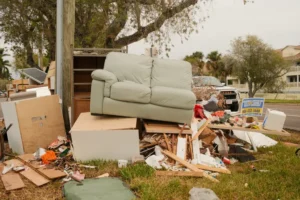
Clear your drains and gutters, secure outdoor furniture, and consider putting up hurricane shutters. Don’t forget to charge your cell phones and consider backup power sources in case the power goes out.
Stay Informed It’s important to know if you live in an evacuation zone, which is listed at the end of this article. You may need to leave your home quickly. Make sure you know the best evacuation routes, practice evacuating with your family and pets, and decide where you will stay.
Follow local emergency managers’ advice. They work with other agencies and will give the latest information based on the risks to your community and the necessary safety measures.

Check On Your Neighbors Check on your neighbors, especially seniors or people who may need extra help. Make sure they have a hurricane plan in place, and offer help in securing their preparations if needed.
Stay Out of Flood Water Do not enter floodwaters. Even six inches of fast-moving water can knock you over. Stay safe by avoiding flooded areas.
Turn Around, Don’t Drown Just one foot of moving water can easily carry away a vehicle. Always avoid driving through flooded areas. If you encounter flooding, turn around and find another route.

Take Care of Your Mental Health It’s important to take care of your mental health during and after a hurricane. If you feel anxious or stressed, talk to friends, family, or a professional to help deal with your concerns.
Evacuate: Know Your Zone and Stay Safe Tampa Mayor Jane Castor has warned that residents must follow evacuation orders as Hurricane Milton approaches. She said, “If you stay in one of those evacuation areas, you’re putting your life at risk.”

Tampa, in Hillsborough County, has ordered mandatory evacuations for Zones A and B and for all mobile homes. The city urges residents in these areas to evacuate immediately.
Here are the counties with evacuation orders:
Charlotte County: Mandatory evacuation for residents in Zones A and B and mobile homes.
Citrus County: Mandatory evacuation for residents in campers, mobile homes, and areas that can’t withstand winds of 110 MPH.
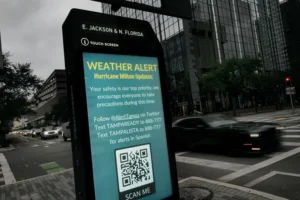
Collier County: Voluntary evacuation for Zones A and B. Mandatory evacuation for Zones A and B started on October 8, 2024.
DeSoto County: Mandatory evacuation for Zones A and B, including mobile homes and flood-prone areas.
Clay County: No mandatory orders, but residents in flood-prone areas are advised to evacuate.
Hardee County: Evacuation advised for low-lying areas and mobile homes.
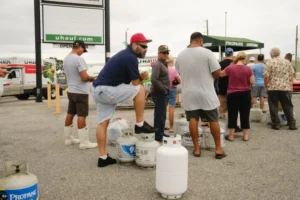
Glades County: Voluntary evacuation for mobile homes and low-lying areas, starting October 8, 2024.
Hillsborough County: Mandatory evacuation for Zones A and B, including mobile homes, starting October 7, 2024.
Hernando County: Mandatory evacuation for all areas west of US 19, starting October 8, 2024.
Lee County: Mandatory evacuation for Zones A and B, urging residents to leave by October 8, 2024.
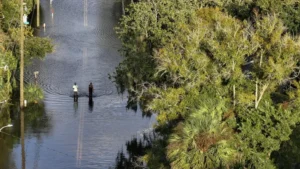
Manatee County: Mandatory evacuation for all residents in Zones A, B, and C, starting October 7, 2024.
Miami-Dade County: Voluntary evacuation center for mobile home residents starting October 8, 2024.
Okeechobee County: Voluntary evacuation for low-lying areas and mobile homes starting October 8, 2024.
Pasco County: Mandatory evacuations for Zones A, B, and C, as well as mobile homes.
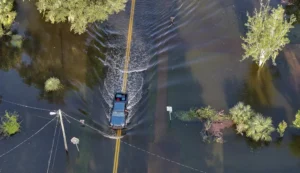
Pasco County: Mandatory evacuations for Zones A, B, and C, as well as mobile homes.
Sarasota County: Evacuation for Zones A and nearby areas, as well as mobile home communities.
Pinellas County: Mandatory evacuation for Zones A, B, and C, including mobile homes.
Volusia County: Mandatory evacuation for areas east of the Intracoastal Waterway starting October 9, 2024.
Sumter County: Urged evacuation for residents in mobile homes and low-lying areas.
Putnam County: Recommended evacuation for flood-prone areas.
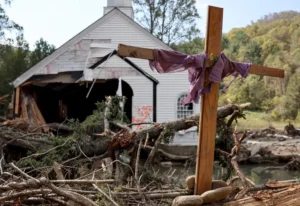
By following evacuation orders and understanding your zone, you can evacuate safely and allow emergency services to respond more effectively.
